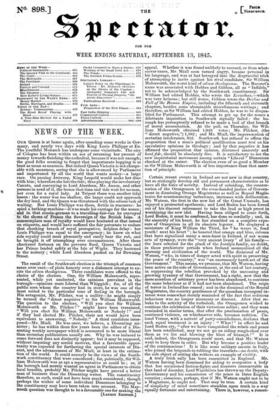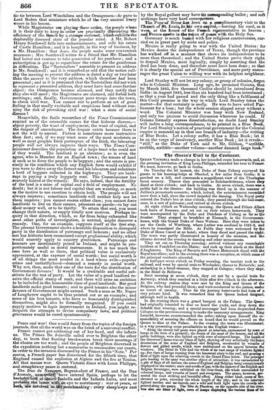Certain recent events in Ireland are not new in that
country, but so strikingly develop old and permanent characteristics as to have all the force of novelty. Instead of subsiding, the conster- nation of the Orangemen at the even-handed justice of Govern- ment in dismissing Orange Magistrates as well as Repeal Magis- trates for countenancing turbulence, increases with deliberation, Mr. Watson, the first in the new list of the Great Unmade, has enjoyed a protracted apotheosis ; and Lord Roden has been forced out of his discreet retirement to take the lead as high priest in worshiping the new idol. Having been obliged to come forth, Lord Roden, it must be confessed, has done so cordially ; and, in the sincerity, of his heart, he has stumbled on a complete expo- sure of Orangeism in all its obsolete bigotry. He displayed a miniature of King William the Third, for he wears it, fond youth! next his heart "; he boasted that orange and blue, colours that have signalized many a man-hunt in Ireland, if not worse acts of tyranny, were the "very ancient livery" of his family— the hues selected for the plush of the Jocelyn family, no doubt, in those przehistoric periods when Ireland monopolized all the learnnig and civilization of the world. The dismissal of Mr. Watson, " who, in times of danger acted with spirit in preserving the peace of the country," was "an enormously harsh act of the Government." This means, we presume, that Mr. Watson, having been active on the side of Government, at the end of last century, in suppressing the rebellion provoked by the unceasing and growing tyranny of that Government, has a right, now that the mere assertion of arbitrary power has been abandoned, to continue the same behaviour as if it had not been abandoned. The reign of terror in Ireland has ceased ; and in the dismissal of the Repeal Magistrates, the country gentlemen of the quondam insurgent in- terest were somewhat sternly reminded of the fact that seditious behaviour was no longer necessary or discreet. After that re- buke to the activity of the turbulent, the Orangemen wished to continue the celebration of their victorious sallies ; and they were reminded in similar terms, that after the proclamation of peace, continued violence, on whichsoever side, becomes sedition. Co- lonel Verner, with a naivete of party-onesidedness, declares that such equal treatment is an injury : " What!" in effect he and Lord Roden cry, " after we have vanquished the rebels and peace has been established, may we not go on riding rough-shod over them as we list and blowing the blast of triumph?" It is said, indeed, the Orangemen would meet, and that Mr. Watson went to keep them in order. But why become a positive leader of the contumacious ? It is like some military escorts in Italy, who joined the brigands in robbing the travellers—no doubt, with the sole object of setting the robbers an example of civility. A truly Irish sally has been committed in England. Mr. Watson having been dismissed for aiding to reorganize a body that has occasioned faction-fights and disasters innumerable in that land of disorder, Lord Winchilsea has thrown up the Deputy- Lieutenancy and his commission of the peace in three English counties ; conscious, perhaps, that if Mr. Watson ought not to be a Magistrate, he ought not. That may be true. A certain kind of simplicity of mind sometimes stumbles. upon truth in a way equally fortunate and entertaining. There is, however, a roman-
tic tie between Lord Winchilsea and the Orangemen—he gave to Lord Roden that miniature which he of the very ancient lrwry wears in his bosom.
While Magistrates are playing these antics, the people wham it is their duty to keep in order are practically illustrating the efficiency of the Bench by a strange outbreak, whiehexhibits the deplorably diseased state of the popular mind. A Mr. Robert Henry Southwell falls into embarrassments, and sells his estate of Castle Hamilton ; and it is bought, in the way of business, by a Mr. Hamilton : that done, the people make some convenient murmurs ; Mrs. Southwell writes to a friend that Mr. Hamilton had better not venture to take possession of his purchase ; and a Subscription is got up to repurchase the estate for the gentleman in difficulties. The " Teetotallers" assemble to present an address to Mr. Southwell : and it is remarked as odd that the notice call- ing the meeting to present the address is dated a day or two later than the answer to the very address, which therefore had been presented ; and as it is iaresumed that the Teetotallers did not wish to represent a presented address, they must have had some further object: the Orangemen become alarmed, and they notify that they also will meet ; the Magistrates are alarmed, and forbid both meetings; and, finally, Government pour troops into the town, to check civil war. You cannot stir to perform an act of good ,feeling in that madly excitable and suspicious land without run- ning the risk of provoking civil war : what a state of social alisease
Meanwhile, the facile researches of the Times Commissioner .remind us of the ostensible causes for that hideous disease,— abject poverty, the want of employment, the want of capital, and the despair of amendment. The 'despair exists because there is not the will to amend. Fiction is sometimes more instructive than fact ; and, if we may trust some of the most moderate as well as most graphic Irish portrayers of the Irish, the labouring people will not always improve their ways. The Times Com- missioner describes the population of a large tract who could not if they would. The landlord is an absentee ; so is even the agent, who is Member for an English town ; the tenure of land as such as to force the people to be beggars ; and the estate is pre- cisely in the condition which any English farm would exhibit if you were to drive away the farmer and his labourers and substitute a herd of beggars collected in the highways. They are bank- rupt in paying a truly beggarly rent. The Commissioner has :scarcely hinted at the remedy. He says, indeed, that the fertility of the land is a mine of capital and a field of employment. No doubt; but it is not labour and capital that are wanting, so much as the motive to use exertion to obtain both. The people will not always improve ; sometimes landlords will neither help nor let them improve : you cannot coerce either class ; you cannot force landlords to live on their estates, prisoners on parole—to lay out their money well, or to be thrifty. To attain that end, you must change their nature, or supply totally new motives. Per in- quiry in that direction, which, so far from being exhausted like most other paths of investigation, is untried, might discover a remedy. One, for an example, suggests itself at the first step. The present Government shows a laudable disposition to disregard party in the distribution of patronage and honours ; and no other test has hitherto been enunciated except professional ability, which would scarcely apply to country gentlemen. Patronage and honours are inordinately prized in Ireland, and might be pro- portionately useful as moral instruments. It is too much the ease here as well as there, that political value is exclusively appreciated, at the expense of social worth ; but social worth is of all things the most needed in a land whose evils—popular crime and unthriftyhood--demand a remedy in social worth. Why not, then, make that one of the tests for the distribution of Government favours? It would be a creditable and useful sub- Atitute for the test of party. Let the value of a good landlord re- ceive the official stamp of rank, and there will arise an ambition to be included in the honourable class of good landlords. But good landlords make good tenants ; and to good tenants also the minor favours of Government might extend. Such a man as Mr. Naper of Loughcrew ought to be thus pointed out as an example; and some of his best tenants, who have so honourably distinguished themselves, might also be formally recognized. If you could - supply motives to begin improvement in Ireland, you might re- linquish the attempts to devise compulsory laws, and political grievances would be cured spontaneously.



























